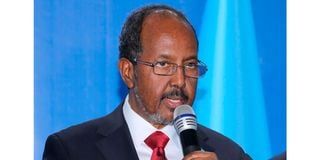Integrating Somalia into EAC bloc a masterstroke

Somalia President Hassan Sheikh Mohamud.
The Federal Republic of Somalia joining the East African Community (EAC) was long overdue. The delay was due to unavoidable circumstances emanating from lack of a recognised government since the 1991 civil war.
But it would deposit its ratification instruments of the Treaty of Accession with the EAC Secretary-General at the EAC headquarters in Arusha, Tanzania, on March 4.
The horn of Africa nation is now officially the eighth partner state of the EAC. It can participate and explore the benefits of the regional bloc as per its mission, “To widen and deepen economic, political, social and cultural integration in order to improve the quality of life of the people of East Africa through increased competitiveness, value added production, trade and investments”.
That gives it the green light to develop its integration roadmap into the EAC. It will involve detailing how Somalia will implement EAC commitments — including Common Markets, Customs Union and Political Federation.
In return, it stands to benefit from the bloc’s regional infrastructure projects, such as the energy, railways and road networks. That will improve its connectivity through enhanced transportation links to boost regional trade.
That notwithstanding, Somalia brings to the table the longest national coastline in Africa (over 3,000 km), which links Africa to the Arab Peninsula.
Upon proper tapping, that could boost exploitation of its blue economic resources and increase intra-regional trade, improving the lives of the East African Community citizens as a whole.
The East African Community’s population is 302.2 million, occupying 5.4 million square kilometres of land. Some 30 per cent of them are urban dwellers. Realisation of its $312.9 billion GDP will be of great strategic and geopolitical significance as well as reinvigorated and renewed EAC prospects.
Treaty
Above all, EAC’s work is guided by its Treaty, which established the Community. Somalia’s acceding to this Treaty on December 15, 2023 and gaining full membership last month implied that the Horn of Africa nation is committed to the Treaty’s guidelines.
The East African Community integration agenda is in full stead — as evidenced by the progress of its Customs Union, Common Market establishment in 2010 and Monetary Union Protocol implementation. Moreso, its political federation plan is being fast-tracked suggesting determination to become a powerful and sustainable economic and political bloc.
This integration will benefit Somalia and it's neighbours. For example, through the Customs Union, Mogadishu plans to further liberalise intra-regional trade in goods on the basis of mutually beneficial trade deals; promote efficiency in production within the EAC; enhance domestic, cross-border and foreign investment in the bloc; and to promote economic development and diversification in industrialisation in the Community.
The reduction of tariff and non-tariff barriers and integration into future infrastructure projects that boost trade and reduce transport costs by linking the EAC partner states will expand its entrepreneurs’ investment opportunities to ease the socioeconomic pressures caused by its isolation.
But Somalia faces a daunting challenge.
Article 3 of the East African Community Treaty requires member states to “adhere to principles of good governance, democracy, the rule of law, human rights and social justice”.
Somalia still has security issues, contrary to the peace, security and stability in EAC. However, efforts towards a functional administration, like the renewed fight against extremism that has forced the militants to retreat, are promising.
Recently, Parliament approved the scrapping of the 4.5 clan power sharing formula, which heralds a free democratic process where leaders will be elected on merit.
- Mr Mohammed Ahmed Awil, an international relations consultant, was Somalia's Ambassador Extraordinary and Plenipotentiary to China. [email protected]. @m_amb





